Four LGBTQ+ refugees share their stories of hope, resilience and courage in the face of anti-migrant rhetoric
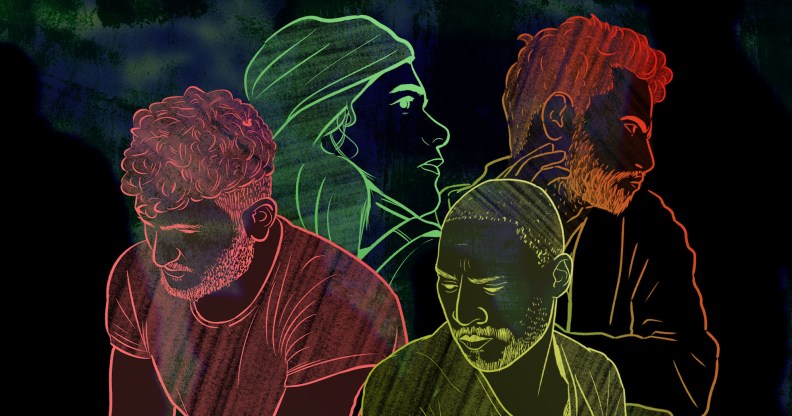
Even in the face of unspeakable loss, the four refugees PinkNews spoke to have not stopped fighting for a better world. (PinkNews)
Over the last year, anti-immigration rhetoric has plumbed new depths in the UK and across the world.
From endless debate about the government’s Rwanda plan to harmful commentary about migrants in the media, 2023 has been a painful year for the many people who travel to the UK in search of safety and security.
But even in the face of such attacks, LGBTQ+ refugees and people seeking asylum have continued to fight for a better life for themselves and others – and they’ve been able to find hope, even in the darkest of moments.
We spoke to four refugees living in the UK to hear their powerful stories of resilience and to ask them about their hopes for the future. They spoke of love, loss, pain and trauma – but above all else, it was their dreams that shone through.
Even in the face of unspeakable loss, the four refugees PinkNews spoke to have not stopped fighting for a better world. Here are their stories.
Mlo fled Iraq after his family found out he was gay
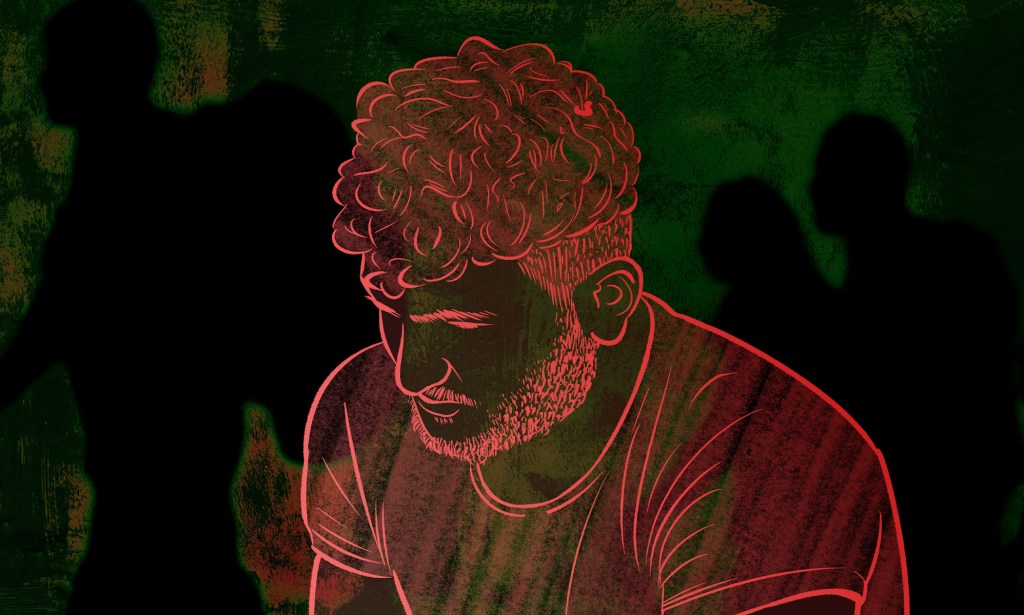
When Mlo fled his home country of Iraq, all he wanted was to find safety – a place where he could be himself without fear of persecution.
“The main reason why I left my home country Iraq was because I am a homosexual,” Mlo tells PinkNews. “You cannot tell anyone in Iraq and you cannot discuss those things with anyone.”
A few years ago, Mlo – who is now aged 34 – formed a powerful friendship with a male colleague. Before long, they fell in love, but everything changed when their families discovered the true nature of their relationship.
“They tried to eliminate us, they tried to kill us, only because we were homosexuals,” Mlo says.
“His father came to my family and told them that I am the one who turned his son into a homosexual … these are the main reasons we decided to go to Europe or any other country that would give us hope.”
Together, they made their way to Turkey, but their relationship suffered. “I decided not to contact my family or to reconcile with them because I gave up on them when they discovered that I’m gay, but for [him] it was different.”
In the end, Mlo and his boyfriend went their separate ways. He has since heard that his ex made his way to another European country, and Mlo is glad he’s building a new life for himself.
Meanwhile, Mlo made his way to the UK so he could live his life free from the fear of violence.
“Right now I’m in a safe country and no one can hurt me because I’m a homosexual. Even if someone can do such a thing, I know there’s a government, there are organisations, a lot of people who are backing me. It’s not like in my country where, when you’re a homosexual, you don’t even exist. Here, it’s different.”
He was recently granted refugee status, and he’s already making plans for the future. In 2024, he hopes to find a job, integrate more into his local community, and improve his English and IT skills.
But he also wants to help make life better for LGBTQ+ people in Iraq. He and a friend are planning on launching a website for queer people in Iraq which will publish articles and information about LGBTQ+ identities.
He also wants to show people in the UK that refugees are not a threat.
“We are not the enemies. What we are trying to do is be part of a community and respect this community as it is and respect their values.
“As a refugee I would like to tell them that we are here to build this country to a better future for everyone, whatever they are and whatever beliefs they [have]. We are a part of this country and we are a part of this community.”
Lindon is living his life ‘freely’ since he came to the UK
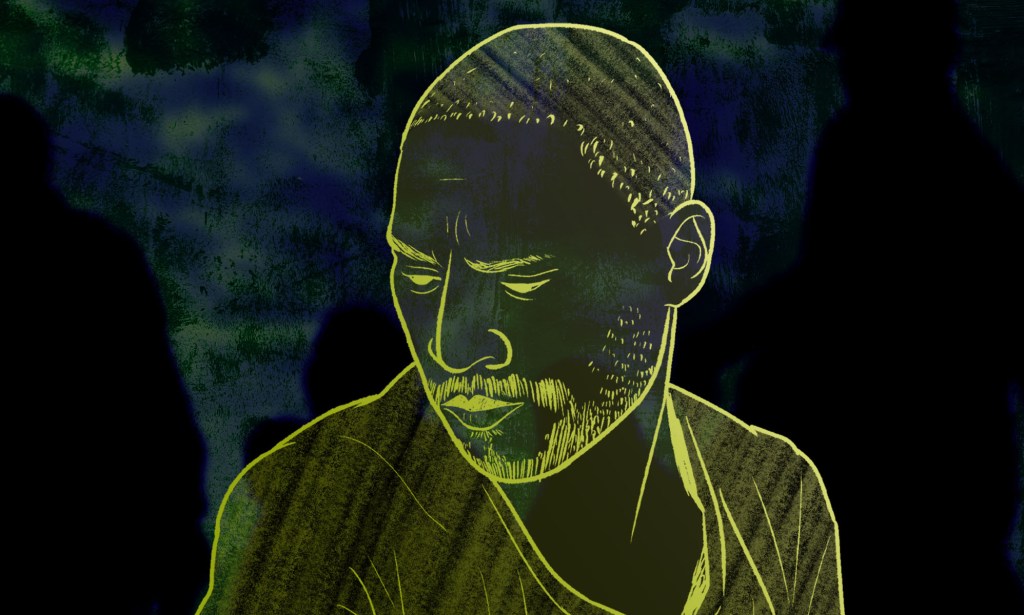
Lindon was born in Guyana but grew up on a small island in Barbados. Like Mlo, he came to the UK because his sexuality was not accepted.
“I was terrified by the stuff that happened to me back then and that is what led to my decision to flee and to leave everything I had behind, the place I called home, and my so-called family. I came to the UK hoping for a better start – for a place where I can live freely, where I don’t have to hide.”
Lindon, who is now aged 23, initially assumed the process would be relatively straightforward, but finding his feet in the UK wasn’t easy. He quickly found himself embedded in an asylum system that is creaking at the seams.
After he spent some time living in hotels and hostels, Lindon had a breakdown. That was when he reached out to LGBTQ+ asylum charity Micro Rainbow – they were able to help him access safe housing, which he says was “the best thing that could have happened” to him.
“I started college because of that and now soon, hopefully I can pursue a career in aviation. I’ve managed to graduate with my qualifications for cabin crew and now I’m back in college again doing aviation operations, expanding my knowledge on a larger scale. Hopefully one day I’ll be in the industry.”
In 2024, Lindon hopes he will break into the aviation industry. His dream is to work for Virgin Atlantic, which is his favourite airline.
“My long-term goal in the UK is to have a stable, happy and successful life. That’s what I want for myself because I’ve never had that – I don’t know what it feels like to be in a happy household, so hopefully I’ll be able to build on that and find that in the UK.”
He adds: “I know it’s not going to be easy but I just hope everything is going to work out the way I want it to and I’ll be able to look back one day and say, ‘Yes, I’ve made it.’ Now that I’m in place where I can make it happen, I do intend to go after everything I want, and live the life that I want to live.”
Sulaiman is slowly starting to come out after fleeing Afghanistan
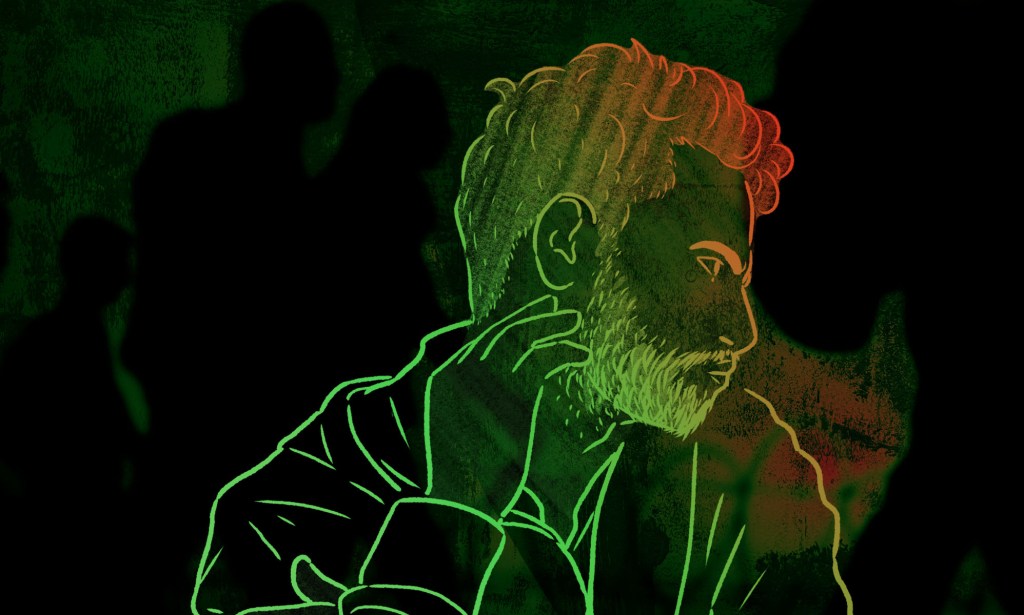
When the Taliban seized power in Afghanistan in August 2021, Sulaiman knew he needed to get out.
As a gay man, he knew he would be an immediate target for a regime that views homosexuality as a sin.
“It was horrendous. It was hard to imagine, and with all the insecurity, the fear, you can’t see any future for yourself. You should be hidden. You can’t express yourself, you can’t go out, so life is full of fear and a feeling of insecurity everywhere, even in your family.
“When the Taliban took over everything just got worse and worse. It was very, very hard.”
Sulaiman eventually came to the UK as part of a resettlement programme. Doing so enabled him to be himself more openly and to live life without the threat of persecution hanging over him.
“Life is getting better,” he tells PinkNews. “I used to live in a hotel for nearly two years, and it’s now been almost two months since I moved into my own place … Life was a little bit frustrating in the hotel, but now I live by myself and have my own space, so it’s better.”
He has managed to make some friends through work and through his local gym. He enjoys his job, and he’s already making plans to go back to university so he can build a brighter future for himself.
But perhaps Sulaiman’s biggest achievement since coming to the UK is that he’s slowly but surely finding the courage to come out.
“I have changed a lot from the day that I came here, because I was very conservative. Now I feel that I’m almost ready for coming out,” he says.
“When I came here, I really didn’t want to come out, but now it’s getting very good. I have told some of my friends, and the journey is getting easier. I feel that one day, not very far off, I will be able to come out [fully], but at the moment I am not 100 per cent sure.
“I do feel changes in my mindset, knowing that people are not judging me here. The people are quite open-minded and my colleagues, my friends, are very OK with it, so I’m feeling a little bit comfortable to start paving the way.”
Hiba Noor wants to advocate for LGBTQ+ rights after she survived against all the odds
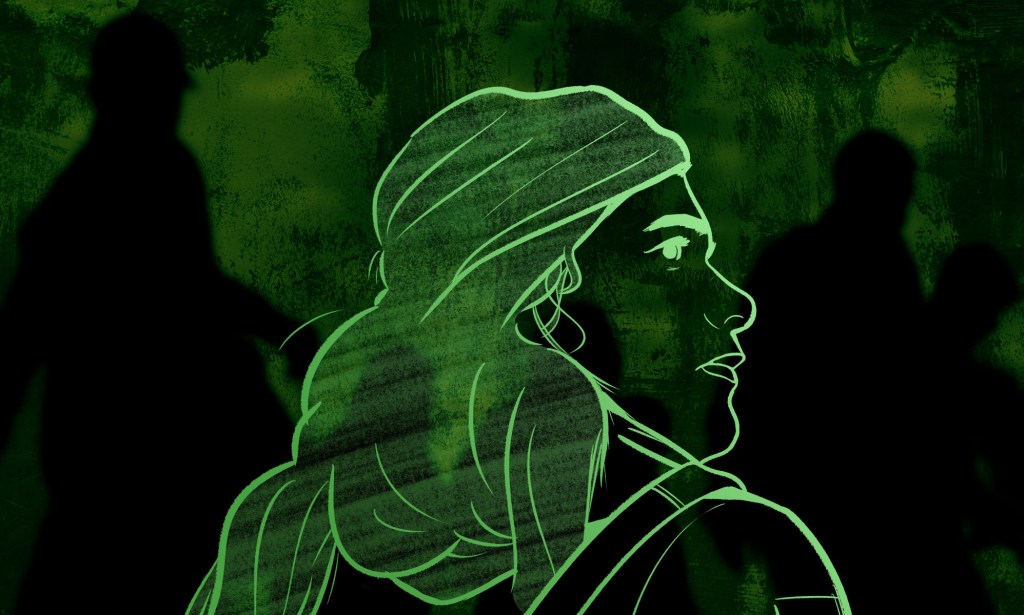
Hiba Noor was working as a filmmaker in Pakistan when her life began to crumble around her.
At the time, Hiba was in the process of transitioning – an act that put a target on her back in a country where LGBTQ+ identities are largely not tolerated.
But Hiba’s situation quickly went from bad to worse when a conservative Islamic group started harassing her after they found out about her gender identity.
She recalls with clarity the terror she felt as they repeatedly called her on private numbers, threatening to kill her because she was trans.
Her family also became targets. Her brother was killed in 2018, and she believes the organisation that had been intimidating her was behind his death.
“His sin was supporting me the way I am. He was my best buddy, my brother, my protection,” Hiba tells PinkNews.
Things took a turn for the worse when Hiba’s mother was diagnosed with liver cancer. They went to a private clinic for treatment, but when doctors were threatened by the group that was pursuing Hiba, they sent them away.
Without treatment, Hiba’s mother died.
“I couldn’t attend her funeral, her last journey. My protection, my true love, my mum, my brother, gone. I was under the dark sky in that country, in my own country.”
Hiba was certain she would be killed if she stayed in Pakistan, so she started looking for a way out. She managed to get a visa to travel to the UK, but even then, the threats from the Islamic group did not stop.
“The day I received my passport, a private number called me and said, ‘Oh, you are really sharp, you got a visa for the UK, but you cannot fly from any airport in Pakistan. We have people everywhere and you will be shot at the airport.”
Terrified, Hiba contacted a friend of her mother’s, whose husband worked in airport security. He was able to help her get safely on a plane to Heathrow.
“I was on the plane and I was thinking, maybe those people are on the plane too and they’re going to kill me. All the way for the 14 hour journey, I kept my head down, and when I arrived in Heathrow, I felt like I was a dead soul. I left my country, I left my culture, my mum, my father, my brother, and I came to the UK and I sought asylum.”
In the UK, Hiba was rescued by a worker with Care4Calais. They put her in touch with Micro Rainbow, an organisation that provides safe housing for LGBTQ+ people seeking asylum.
“I accepted myself, and for the first time in my life, I feel like I’m not an animal – I’m a human being.”
Today, Hiba finally has refugee status, and she is slowly working through the traumas she endured to get to where she is today.
As she looks towards the future, she hopes to continue to develop her career as a filmmaker – but she also wants to give back by advocating for human rights.
“Every single word which I bring from my past brings pain and shadow, but now I have a mission … I want to bring an impact to the UK LGBTQ+ society in human rights. We LGBTQ+ people, we deserve kindness, and I want to talk more about that through my storytelling. I want to bring sympathy for people who came from different countries.”
She adds: “I want to tell the world that we LGBTQ asylum seekers, we are not here to enjoy the UK weather – we are not here for any other purpose. We are here because we were kicked out from our countries because we don’t have acceptance the way we are, and for that, we don’t need any stamp from the government.”
